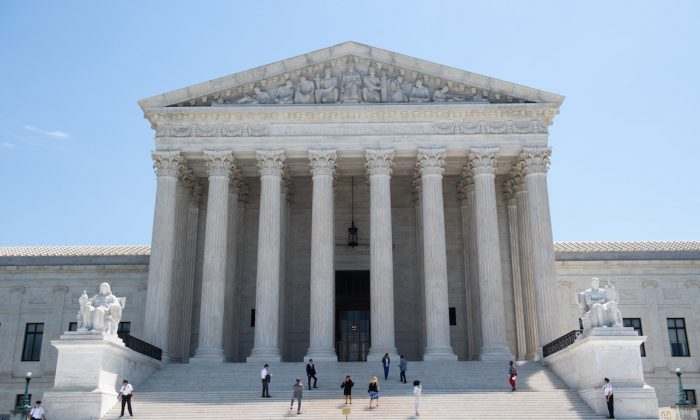WASHINGTON—The Supreme Court considered for the second time whether the parents of a foreigner killed outside the country—in this case, in Mexico—by a U.S. law enforcement officer can pursue a claim for damages against the officer.
During oral arguments this week, some of the justices suggested that allowing the lawsuit to proceed could have serious foreign policy consequences, a concern that was echoed by the Trump administration. The U.S. Department of Justice filed a brief in support of the officer that expressed concern about the potential disruption of diplomatic discussions by a lawsuit that could “directly undermine the credibility of the executive branch in working with a foreign government.”
In a case cited as Hernandez v. Mesa, the justices heard arguments that revolved around something lawyers call a Bivens action, a kind of lawsuit for damages that can be filed when a federal officer, acting under federal authority, violates a constitutionally protected right. The legal doctrine was established in the 1971 Supreme Court decision known as Bivens v. Six Unknown Named Agents. Civil lawsuits against government officials generally aren’t permitted when the officials have acted in good faith while executing their duties.
U.S. Border Patrol agent Jesus Mesa shot and killed Mexican national Sergio Hernandez, 15, on June 7, 2010. Hernandez had been playing with his friends on the Mexican side of a concrete culvert that marks the boundary between Ciudad Juarez, Mexico, and El Paso, Texas. The game the teenager was playing involved running up a steep embankment to the border fence on the U.S. side, touching the fence, and then running back to the Mexican side.
An FBI investigation determined that a group of young men began hurling rocks at Mesa, who grabbed one of the youths and, as he was holding him, aimed at the others and fired twice, killing Hernandez several yards away in Mexican territory. Although video evidence didn’t corroborate Mesa’s claim about the rock-throwing, the U.S. Department of Justice found Mesa hadn’t violated Border Patrol policies and declined to prosecute him.
Mexican authorities indicted Mesa for the killing, but the United States has refused to extradite him.
“The United States and Mexico have an active disagreement over what happened here,” Jeffrey B. Wall of the U.S. Solicitor General’s office told the Supreme Court during oral arguments Nov. 12.
The 5th Circuit Court of Appeals ruled the decedent’s family couldn’t pursue a claim that the young man’s constitutional rights were violated because Hernandez, who lacked familial or other ties to the United States, was a Mexican citizen present on Mexican soil at the time of the shooting.
The family appealed to the Supreme Court, which in turn remanded the case to the 5th Circuit in 2017 for reconsideration, in light of Ziglar v. Abbasi, a decision from the same year in which the high court dramatically limited the application of the Bivens doctrine. In the Ziglar case, the Supreme Court found that illegal aliens arrested after the terrorist attacks of Sept. 11, 2001, couldn’t sue federal officials over the conditions of their confinement.
On March 19, the 5th Circuit upheld the lower courts’ dismissal of the case and refused to expand the ability of the plaintiffs to sue Mesa. On May 28, the Supreme Court agreed to consider the case again to determine if the plaintiffs, who claim Mesa was a rogue federal law-enforcement officer, can pursue the officer.
During oral arguments, Chief Justice John Roberts told Hernandez family lawyer Stephen Vladeck he was concerned that allowing the lawsuit to move forward, despite official findings that Mesa didn’t violate policy, would send the wrong message.
“At least with respect to foreign relations, I thought the country was supposed to speak with one voice,” Roberts said.
Justice Neil Gorsuch suggested if the suit proceeded, U.S. military and diplomatic personnel abroad could be subject to liability.
Vladeck, a professor at the University of Texas School of Law, argued that U.S. constitutional rights shouldn’t terminate at international boundaries.
There should not be a “categorical on-off switch at the border,” he said.
Vladeck said the decedent’s family needed to have a way to hold the officer in the case accountable for the use of excessive force.
“Not only was respondent standing on U.S. soil when he pulled the trigger, but he could not have known in that instant where the bullet would even land, let alone the nationality of anyone it might hit,” he said, adding “for petitioners here it is Bivens or nothing.”
Justice Ruth Bader Ginsburg pressed Mesa’s attorney, Randolph J. Ortega, who said allowing the suit could endanger border security.
“We have a rogue officer acting in violation of the agency’s own instruction, using excessive force to kill a child at play,” she said. “How does that call into question any foreign policy or national security policy?”
Allowing the lawsuit to proceed, Ortega said, “would create a chilling effect as to the border patrol agents in conducting their day-to-day activities.”
This article is from the Internet:Supreme Court Considers Whether Parents of Foreign National Killed by Border Patrol Outside US Can Seek Damages
Supreme Court Justices Appear Inclined to Allow Trump to Terminate DACA
